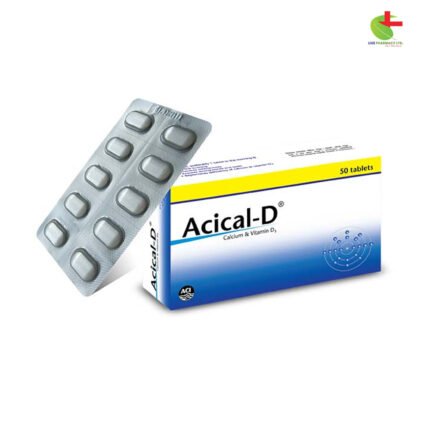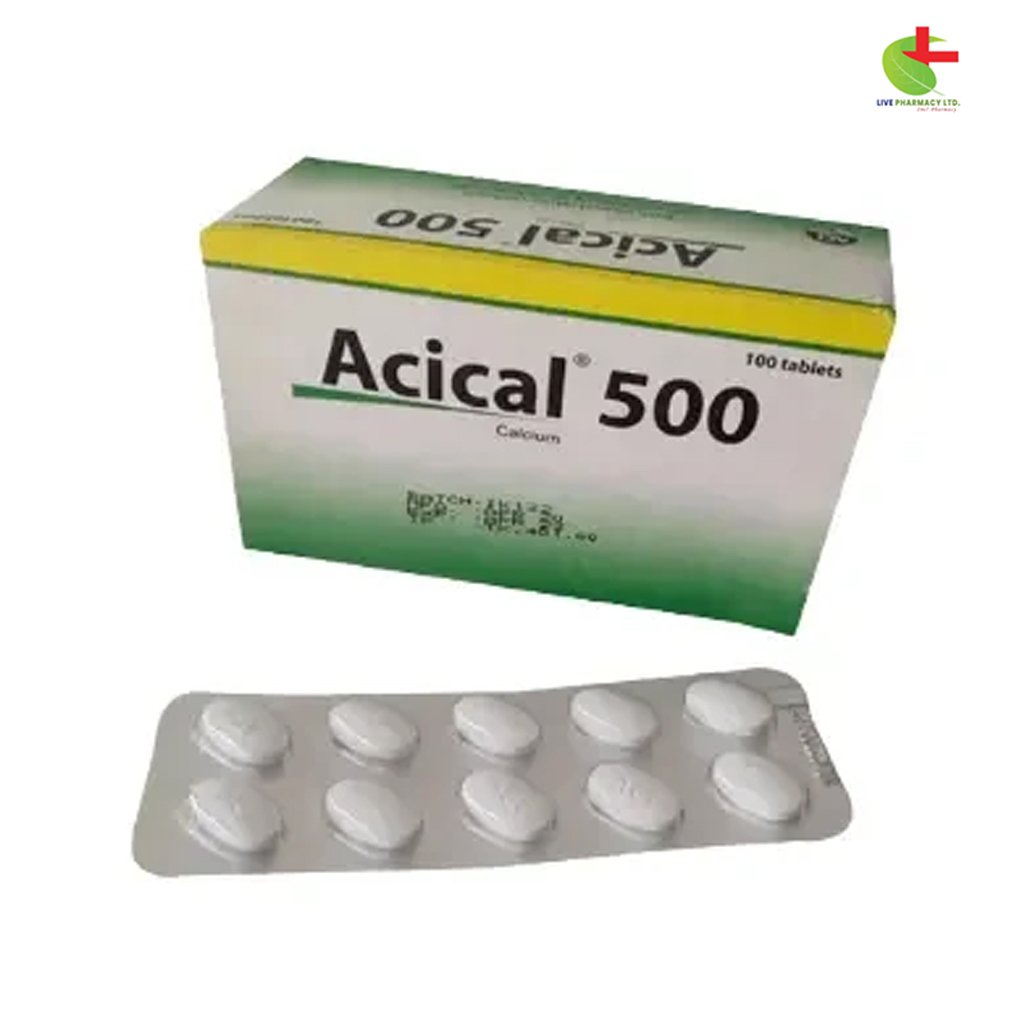

Acical 500
40.10৳ Strip
- Acical is a calcium carbonate-based supplement for treating and preventing calcium deficiency due to conditions like hypoparathyroidism, chronic diarrhea, and renal failure.
- It helps manage hyperphosphatemia in patients with chronic kidney disease and those on dialysis.
- Available in 250 mg, 500 mg, and 1000 mg tablets.
- Provides effective relief from acid indigestion, heartburn, and upset stomach.
- Always use as directed by your healthcare provider.
 Brand
Brand
|
ACI Limited |
|---|---|
 Generics
Generics
|
Elemental Calcium |
 Type
Type
|
Tablet |
Indications
250 mg and 500 mg Tablets: Acical is prescribed for the treatment and prevention of calcium deficiency, particularly when dietary intake is insufficient. Calcium depletion may be linked to several conditions, such as hypoparathyroidism, achlorhydria, chronic diarrhea, vitamin D deficiency, steatorrhea, sprue, pregnancy, lactation, menopause, pancreatitis, renal failure, alkalosis, and hyperphosphatemia. Calcium Carbonate is increasingly used to manage hyperphosphatemia in chronic renal failure and for patients undergoing continuous ambulatory peritoneal dialysis (CAPD) or hemodialysis. In some cases, patients may not tolerate enough calcium to control phosphate levels effectively and may need additional treatments like dietary phosphate restrictions or small doses of aluminum hydroxide. While Calcium Carbonate can offer temporary relief from dyspepsia, long-term use for peptic ulcers is no longer recommended.
1000 mg Tablets: Acical is effective for treating symptoms of hyperacidity, including acid indigestion, heartburn, sour stomach, and general upset stomach.
Always follow your healthcare provider’s advice when using this medication.
Pharmacology
Calcium Carbonate reacts with gastric acid to form a salt and water. The chemical reaction is as follows:
CaCO₃ + 2HCl → CaCl₂ + H₂O + CO₂.
Two grams of Calcium Carbonate can quickly increase the pH of 100 ml of hydrochloric acid above 6, which decreases the activity of pepsin in gastric secretions. Up to 30% of orally ingested calcium may be absorbed by the body.
Dosage & Administration
250 mg or 500 mg Tablets:
Calcium Carbonate is taken orally. For adults, typical doses as an antacid range from 540 mg to 2000 mg of Calcium Carbonate per day, with pediatric doses being half that amount. For osteoporosis prevention, the general recommendation is between 1250 mg to 3750 mg of Calcium Carbonate (500-1500 mg of calcium) daily, though this should be adjusted based on the patient’s needs, such as calcium deficiency or malabsorption. During pregnancy and lactation, a daily dose of 1200–1500 mg of calcium is suggested. For chronic renal failure, the dosage can range from 2.5 to 9.0 grams of Calcium Carbonate daily, tailored to individual requirements. To maximize phosphate binding in chronic renal failure, Calcium Carbonate should be taken with meals.
1000 mg Tablets:
Take 2000–3000 mg when symptoms arise; doses may be repeated every hour as needed or as directed by your healthcare provider.
Always follow your healthcare provider’s advice when using this medication.
Interactions
Calcium Carbonate can enhance the effects of digoxin and other cardiac glycosides if hypercalcemia occurs. It may also reduce the absorption of tetracycline antibiotics when taken concurrently. In patients with chronic renal failure, calcium carbonate may require modifications to vitamin D therapy to avoid the risk of hypercalcemia, especially when used as a primary phosphate binder.
Contraindications
- Hypercalcemia and hyperparathyroidism
- Hypercalciuria and nephrolithiasis
- Zollinger-Ellison syndrome
- Concurrent digoxin therapy (requires careful monitoring of serum calcium levels)
In cases of hypercalcemia, discontinuing the drug usually restores normal serum calcium levels. Use Calcium Carbonate with caution in patients with sarcoidosis, renal or cardiac conditions, or those receiving cardiac glycosides.
Side Effects
Oral Calcium Carbonate may irritate the gastrointestinal tract and can cause constipation. Hypercalcemia is rare but may occur in patients with chronic renal failure when large doses are administered.
Pregnancy & Lactation
Calcium Carbonate is considered safe during pregnancy and lactation and is commonly used as an oral supplement or antacid.
Use in Special Populations
- Pediatric Use: Calcium Carbonate has been extensively studied in children, including those with chronic renal failure, and has proven to be both safe and effective.
- Elderly Use: In elderly patients, particularly those with renal failure, constipation may be a concern when using Calcium Carbonate. Monitoring of serum calcium and phosphate levels is recommended for this age group.
Therapeutic Class
Minerals for bone health and specific mineral supplements.
Storage Conditions
Store in a cool, dry place at controlled room temperature.











Reviews
There are no reviews yet.